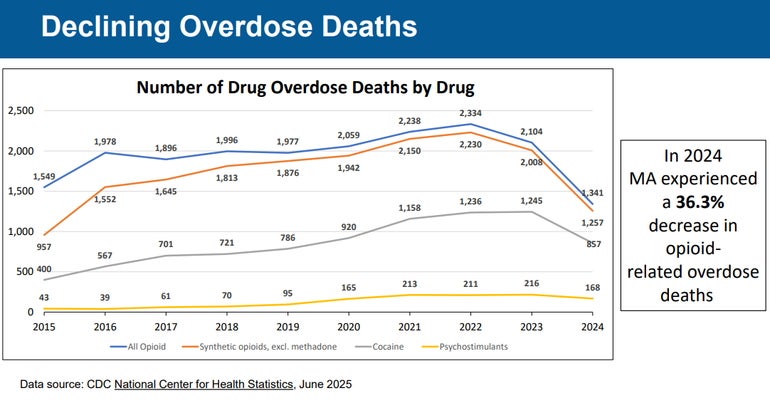Report: Mass. opioid overdose deaths dropped by 36% in 2024
 Image I SHSN/Public Health Council Data
Massachusetts saw opioid-related overdose deaths drop by 36% in 2024.
Image I SHSN/Public Health Council Data
Massachusetts saw opioid-related overdose deaths drop by 36% in 2024.
Massachusetts experienced a more than 36% decrease in opioid-related overdose deaths in 2024, the state Substance Addiction Services Bureau reported Wednesday.
The federal data shows that opioid-related overdose deaths dropped to the lowest level since 2013 -- a decline seen across all races and ethnicities, according to Bureau Director Deirdre Calvert.
The decrease comes alongside a downward trend in opioid-related overdose deaths across Massachusetts and the country. Recent U.S. Centers for Disease Control and Prevention data showed a nearly 27% decrease in drug overdose deaths nationwide from 2023 to 2024. Provisional CDC data estimated a nearly 33% drop in predicted overdose deaths in Massachusetts during that same period. In Boston, data reported in early June showed a 38% decrease in opioid overdose deaths in 2024 compared to 2023, the lowest number since 2015.
Of the 1,763 opioid-related deaths between July 2023 and June 2024 in Massachusetts, 95.8% were overdoses, according to a state data dashboard, which is updated every six months.
The decrease comes as the drug supply continues to be tainted with often deadly substances like fentanyl, xylazine and other stimulants, Calvert said. While only about 88.1% of all opioid-related overdose deaths in Massachusetts in that period had a toxicology screen available, screenings found fentanyl present in almost 92% of opioid-related overdose deaths and cocaine present in nearly 56% of deaths.
"In recent years, fentanyl has been mixed with the veterinary sedative xylazine," Calvert said. "In 2024, xylazine was found in 34% of samples tested by the Massachusetts drug supply data stream, and in 16% of opioid overdose deaths."
Advocates, people with substance use experience and state officials point to investments in substance use prevention, treatment, recovery and harm reduction as a major factor in the decline in overdose deaths. The accessibility of Naloxone, commonly known as Narcan, has also grown in recent years, which experts say significantly helps decrease the chances that substance users experience death from opioid overdoses.
Calvert said Wednesday that while these efforts are necessary to continue to see deaths decline, the mixture of federal, state and other funding the bureau receives isn't matching demand.
"BSAS serves as the payer of last resort for substance use disorder treatment coverage in the Commonwealth, which means we reimburse for services rendered to uninsured and underinsured individuals. There has been a growing demand for BSAS coverage, and while this is an important function of BSAS, it is not fully funded in our appropriations," Calvert said. Billing to the bureau has outpaced its appropriations, she added.
Given the increases in MassHealth reimbursements and billings to the bureau, its report Wednesday said that potential Medicaid cuts "will likely cause some individuals to lose their insurance coverage and increase the burden on BSAS."









0 Comments